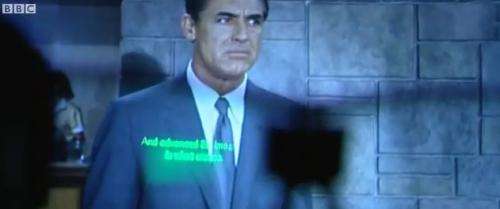(PhysOrg.com) -- Granted, movie subtitles aren’t something most people think about. In fact most groan when they find a movie they’ve paid to see suddenly starts projecting text at the bottom of the screen as it means they’ve entered the dreaded “foreign” zone. For others with hearing difficulties though, subtitles mean the difference between being able to watch a movie, or not. It’s for this latter group that Sony UK has been busy at work coming up with eyeglasses that can be worn that display the subtitles, unbeknownst to the rest of the audience.
The glasses work by projecting the words onto the glasses of the person wearing them in such a way as to not necessitate the wearer having to constantly adjust for near and far; something that would cause enormous eye fatigue. Instead, the effect is almost the same as if the words were projected onto the screen.
Charlie Swinbourne, a person with a hearing impairment, was recently asked by the BBC to give them a go at a Sony test site. He reported that it was a great experience and that it would likely create a whole new viewing audience of movie goers as the deaf community would find them very welcome.
Traditionally, subtitles for movies at theaters for the hard of hearing have only been available during off hours, or not at all, as regular viewers prefer to not have them on the screen while they’re watching. The result has been frustration for such viewers who generally wind up having to rent the video and watch it at home.
The new glasses might be more popular even than Sony expects as they likely aren’t taking into account the aging baby boomer population who quite often find themselves having trouble hearing parts of movies and would appreciate some help from subtitles (especially when there are accents involved). The American Association of Retired Persons (AARP) recently ran an article in its monthly newsletter detailing how many older Americans have quit going to the theater to watch movies for this very reason.
It also seems the glasses would have another advantage over traditional subtitles and that is the ability to move the words a bit when they are blocking some of the action, something that happens more often than some might think.
It also seems conceivable that such glasses could also be used for watching translated movies, (as well as live theater and/or opera) rather than running the subtitles on the screen, and who knows, if the technology really takes off, maybe some of the big names streaming content over the web might start making subtitling an option.
Sony says the glasses should be available in the U.K. sometime next year, and if they catch on, the rest of the world sometime after that.
© 2011 PhysOrg.com





















